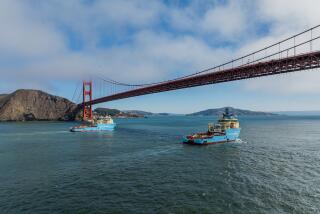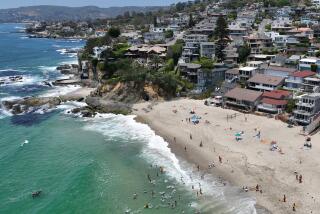Annual Worldwide Coastal Cleanup Day to Seek Out Trash
- Share via
WASHINGTON — Anyone picking up a cigarette butt from the beach Saturday could be part of what organizers say is the world’s largest volunteer effort--the International Coastal Cleanup.
The event held every third Saturday in September since 1986 netted more than 1.6 million cigarette butts last year. That was by far the most common item tossed or that washed up on beaches worldwide. Others included food wrappers, pieces of plastic, bottle caps and shards of glass.
Last year, half a million volunteers picked up 10 million pieces of trash. They covered 12,000 miles of beaches in 70 countries, according to the Center for Marine Conservation, which organizes the global event with other groups, individuals and commercial sponsors.
Organizers are hoping an additional 100,000 volunteers will join the campaign this year to collect even more butts and other trash. Last year, the biggest volunteer corps from any one country came from the Philippines, which had nearly 300,000 people cleaning up. With more than 7,000 islands, the Philippines has among the most miles of shoreline.
The United States had more than 150,000 volunteers.
“From coast to coast and around every major body of water, we have a debris problem,” said Seba Sheavly, director of the Center for Marine Conservation’s marine debris program.
Sheavly plans to be out--bags in hand--at the mouth of the Chesapeake Bay on Saturday. Bad weather associated with Hurricane Floyd has affected some plans, but thousands of volunteers are ready to go, she said.
“After you’ve lugged bags of trash and logged every single piece, you begin to realize that every piece of trash has a person’s face on it,” she said.
About 20,000 divers are joining to clean up offshore debris, with major underwater efforts in the United States, the Philippines, Germany, Italy, Australia, Venezuela and El Salvador.
Globally, less than 20% of beach debris clearly comes from the water. The bulk appears to come from land sources, Sheavly said.
Part of the effort is counting the trash. Volunteers carry cards to record their collections, which will be compiled and used for studies of how to combat the problem year-round.
The cards include a space for peculiar items.
Random items reported include a typewriter in New Zealand, a plunger in Belize and umbrellas in Britain. Among the oddest discards from various beaches are a BMW Gray Sedan, a pitchfork, a cannonball and a baby carriage filled with adult books.
More to Read
Sign up for Essential California
The most important California stories and recommendations in your inbox every morning.
You may occasionally receive promotional content from the Los Angeles Times.













